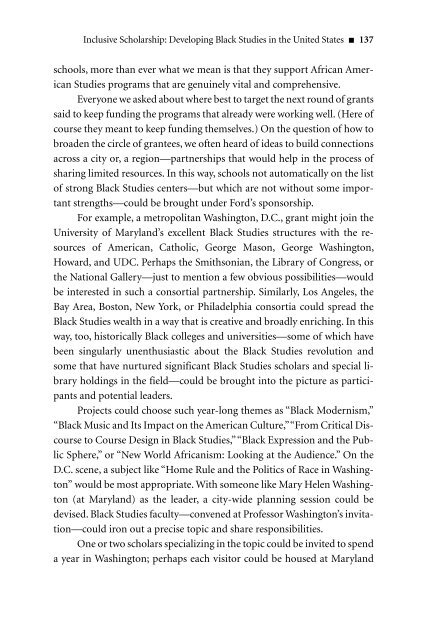Inclusive Scholarship: Developing Black Studies - Ford Foundation
Inclusive Scholarship: Developing Black Studies - Ford Foundation
Inclusive Scholarship: Developing Black Studies - Ford Foundation
You also want an ePaper? Increase the reach of your titles
YUMPU automatically turns print PDFs into web optimized ePapers that Google loves.
<strong>Inclusive</strong> <strong>Scholarship</strong>: <strong>Developing</strong> <strong>Black</strong> <strong>Studies</strong> in the United States 137<br />
schools, more than ever what we mean is that they support African American<br />
<strong>Studies</strong> programs that are genuinely vital and comprehensive.<br />
Everyone we asked about where best to target the next round of grants<br />
said to keep funding the programs that already were working well. (Here of<br />
course they meant to keep funding themselves.) On the question of how to<br />
broaden the circle of grantees, we often heard of ideas to build connections<br />
across a city or, a region—partnerships that would help in the process of<br />
sharing limited resources. In this way, schools not automatically on the list<br />
of strong <strong>Black</strong> <strong>Studies</strong> centers—but which are not without some important<br />
strengths—could be brought under <strong>Ford</strong>’s sponsorship.<br />
For example, a metropolitan Washington, D.C., grant might join the<br />
University of Maryland’s excellent <strong>Black</strong> <strong>Studies</strong> structures with the resources<br />
of American, Catholic, George Mason, George Washington,<br />
Howard, and UDC. Perhaps the Smithsonian, the Library of Congress, or<br />
the National Gallery—just to mention a few obvious possibilities—would<br />
be interested in such a consortial partnership. Similarly, Los Angeles, the<br />
Bay Area, Boston, New York, or Philadelphia consortia could spread the<br />
<strong>Black</strong> <strong>Studies</strong> wealth in a way that is creative and broadly enriching. In this<br />
way, too, historically <strong>Black</strong> colleges and universities—some of which have<br />
been singularly unenthusiastic about the <strong>Black</strong> <strong>Studies</strong> revolution and<br />
some that have nurtured significant <strong>Black</strong> <strong>Studies</strong> scholars and special library<br />
holdings in the field—could be brought into the picture as participants<br />
and potential leaders.<br />
Projects could choose such year-long themes as “<strong>Black</strong> Modernism,”<br />
“<strong>Black</strong> Music and Its Impact on the American Culture,”“From Critical Discourse<br />
to Course Design in <strong>Black</strong> <strong>Studies</strong>,”“<strong>Black</strong> Expression and the Public<br />
Sphere,” or “New World Africanism: Looking at the Audience.” On the<br />
D.C. scene, a subject like “Home Rule and the Politics of Race in Washington”<br />
would be most appropriate. With someone like Mary Helen Washington<br />
(at Maryland) as the leader, a city-wide planning session could be<br />
devised. <strong>Black</strong> <strong>Studies</strong> faculty—convened at Professor Washington’s invitation—could<br />
iron out a precise topic and share responsibilities.<br />
One or two scholars specializing in the topic could be invited to spend<br />
a year in Washington; perhaps each visitor could be housed at Maryland

















